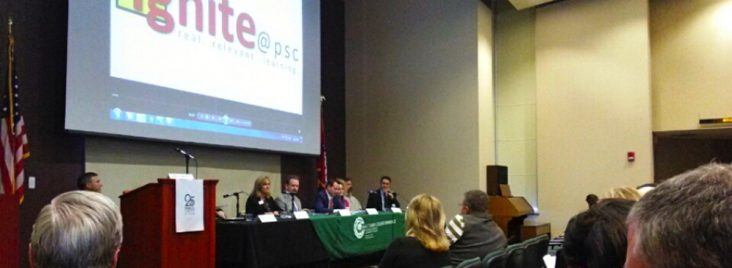Northwest Arkansas schools addressing workforce needs through new programs
by March 15, 2016 5:49 pm 523 views

Educators from across Northwest Arkansas talk about their Exemplar Programs that are designed to connect business and students together in hopes of creating a better prepared workforce for high-need industries. The panel discussion was part of the two-day Northwest Arkansas Regional Business and Industry Partnership Council meeting sponsored by the Northwest Arkansas Education Service Cooperative.
The old ways of getting students interested in a career are dying and partnerships with local business and industry are the new, more effective path, according to a panel discussion at the 3rd Annual Northwest Arkansas Regional Business and Industry Partnership Council.
The Council meeting, sponsored by the Northwest Arkansas Education Service Cooperative, is a two-day event for business, industry, and education leaders to discuss common issues and solutions. The event was scheduled for March 15 and 16 at the Northwest Arkansas Shewmaker Center.
The partnership council’s event “is a collaborative effort of stakeholders, including school districts, the Northwest Arkansas Council, Project Lead The Way, postsecondary institutions, business and industry, and the Northwest Arkansas Education Service Cooperative. The goal of the partnership is to improve Career and Technical Education (CTE) programs in Arkansas to meet the needs of students and employers,” according to a press release issued announcing the event.
The event began with a panel of Exemplar Programs that have been designed within the last couple of years to respond to business/industry needs. Mike Harvey with the Northwest Arkansas Council moderated the panel. The participants included:
• Charley Clark with the Pea Ridge Manufacturing and Business Academy;
• Mike Rogers with Career Academies of Siloam Springs;
• Clayton Williams with the Farmington Mentor Program;
• Teresa Hudson with Ignite-Bentonville;
• Mike Moore representing the Western Benton County schools (Bentonville, Decatur, Gravette, Gentry and Siloam Springs);
• Joe Rollins with the School of Innovation in Springdale; and
• Dawn Stewart with the New Technology High School in Rogers.
Each of these programs, while designed specifically to meet their respective school and community’s needs, have several features in common. For one, they all partner closely with local business and industries to provide hands-on training and mentoring relationships for students.
They also all work toward preparing students to enter the workforce immediately after high school or to be well-equipped to attend college for further training through concurrent enrollment opportunities and career-focused training while in high school.
The programs do a much better job of helping students know what they want to do as a career compared to previous generations’ programs, several panel members agreed. Many of the career focal points are similar including business management, technology, skilled trades and healthcare management. All of the programs focus on career paths that have been identified as needed in the region.
“I feel like we will be moving to more similar models in the next decade,” Harvey said. “Even on the academic side, (the need for practical experience) is changing how we’re teaching. Students learn by doing.”
Part of managing the rapid growth in Northwest Arkansas is making sure the existing available workforce has the right training to fill jobs of companies interested in growing or moving here.
“We will stifle our ability to grow if we can’t find people to do the work,” Harvey said.
Cheryl Pickering, regional career and technical education coordinator for the cooperative, said the goal of the meeting is to provide a forum that allows employers and educators to exchange information.
“Providing a prepared workforce is job one for the education community in Northwest Arkansas, and communication is critical to our efforts,” Pickering said. “The program allows employers to learn about new or enhanced training programs, and educators can learn more about our employers’ workforce needs.”
